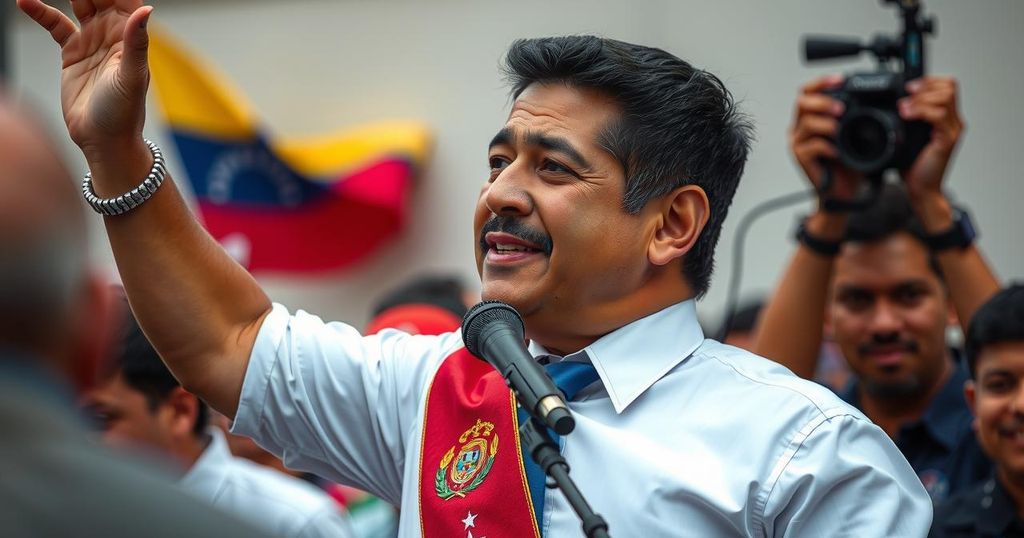Nicolas Maduro was sworn in for a third term as president of Venezuela amidst intense protests and opposition from figures like Maria Corina Machado, who was briefly detained. The international community has condemned Maduro’s regime for its actions against dissenters, leading to widespread calls for democratic reforms and human rights protections. As opposition voices struggle against systemic repression, the political landscape in Venezuela remains precarious and contentious.
President Nicolas Maduro of Venezuela assumed office for a third term amid widespread protests and international outcry regarding his controversial election win. On the eve of the oath-taking ceremony, opposition leader Maria Corina Machado, who emerged from hiding to lead demonstrations, was briefly detained by security forces, igniting further condemnation of Maduro’s regime and its treatment of dissent. Despite officials denying her arrest, witnesses claim her convoy was intercepted, leading to chaos as gunfire erupted.
In reaction to Machado’s detention, U.S. President-elect Donald Trump labeled her and another opposition figure as “freedom fighters” who must be kept safe. The international community, including governments from Ecuador, Spain, and Colombia, condemned the Maduro government as a dictatorship and decried the harassment of political opponents. Italy’s Prime Minister called for recognition of the Venezuelan population’s democratic aspiration.
Machado addressed supporters defiantly, asserting, “We are not afraid,” emphasizing the opposition’s resolve despite increasing repression. Reports of arrests escalated preceding the inauguration, raising alarms from the United Nations about human rights abuses under Maduro’s regime. Meanwhile, challenges to Maduro’s authority persist, including disturbances during his rule that have claimed lives and resulted in thousands of detentions.
Maduro, who has maintained a grip on power since 2013 through a combination of populist policies and oppression, faces ongoing pressure from both domestic and international fronts. His administration, supported by nations such as Russia and Cuba, continues to leverage military and other forms of state power to suppress dissent while asserting legitimacy through coordinated demonstrations.
Former opposition candidate Edmundo Gonzalez Urrutia, who claims to have beaten Maduro, remains outside Venezuela as he navigates international support to contest the election results. His plans to return have been stymied by a hostile environment and government threats against him. Overall, Maduro’s tenure is marked by controversial electoral victories and an increasingly fragmented opposition struggling against a repressive regime that refuses to acknowledge the democratic will of the Venezuelan people.
The political situation in Venezuela has been characterized by ongoing turmoil and conflict surrounding electoral practices and governance since Nicolas Maduro took power after the death of Hugo Chavez in 2013. His re-election in 2018 was widely criticized and deemed illegitimate by many international observers. Political dissidents and opposition leaders, such as Maria Corina Machado, have faced significant repression, including arrests and threats, prompting global concern regarding human rights violations in the country. The support from international allies, alongside internal divisions, shapes the dynamics in which Maduro’s government operates and contends with calls for democratic transition.
In conclusion, Nicolas Maduro’s assumption of a third term as Venezuelan president has been overshadowed by significant protests, international condemnation, and notable repression of opposition figures such as Maria Corina Machado. The events leading to the inauguration reflect a deepening crisis in Venezuela, marked by social unrest, widespread allegations of voter fraud, and a response from the global community that highlights concerns over democratic processes and human rights. The unresolved conflict between the Maduro regime and opposition figures continues to pose critical challenges for the future of Venezuela.
Original Source: www.cbsnews.com






